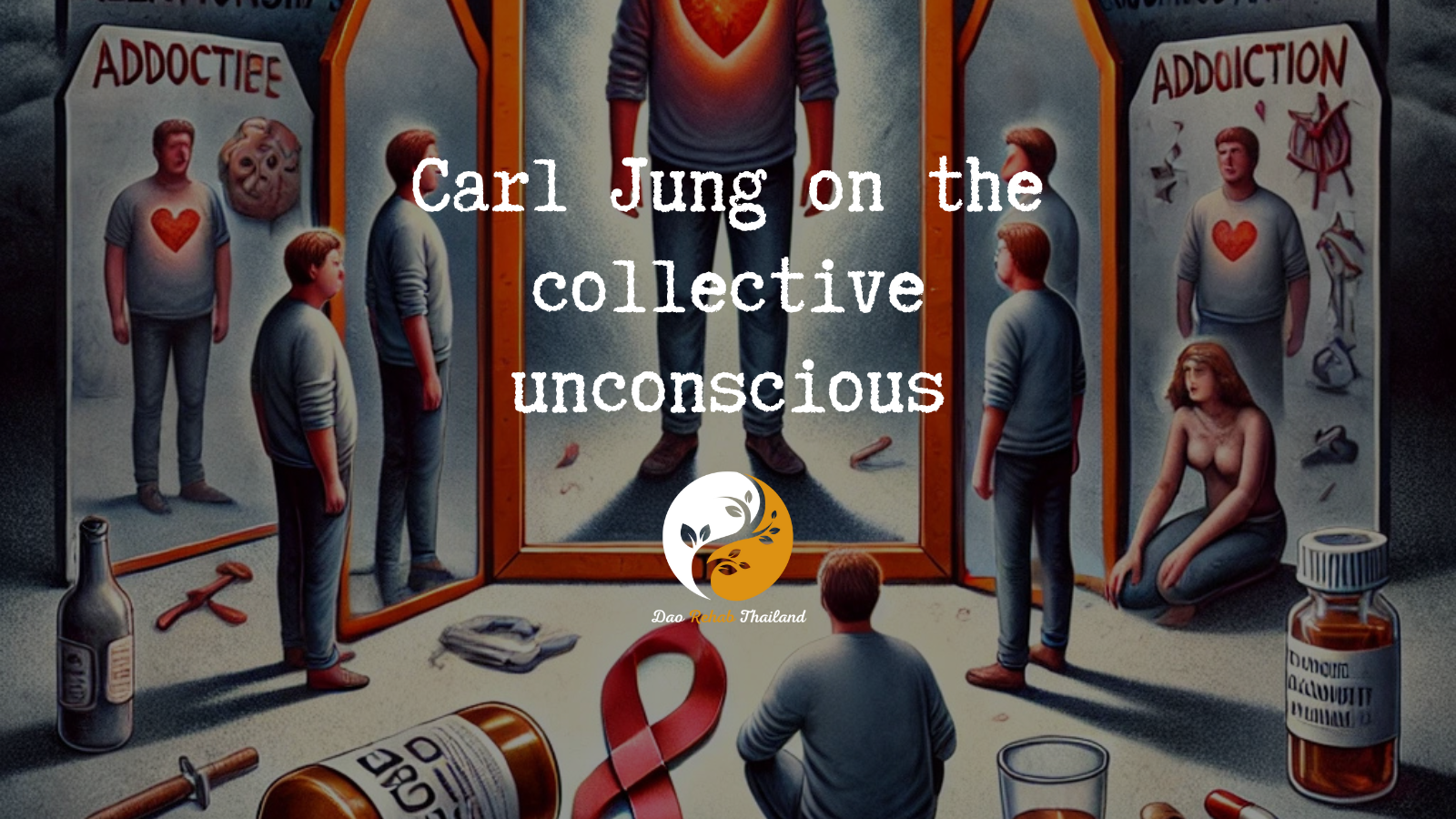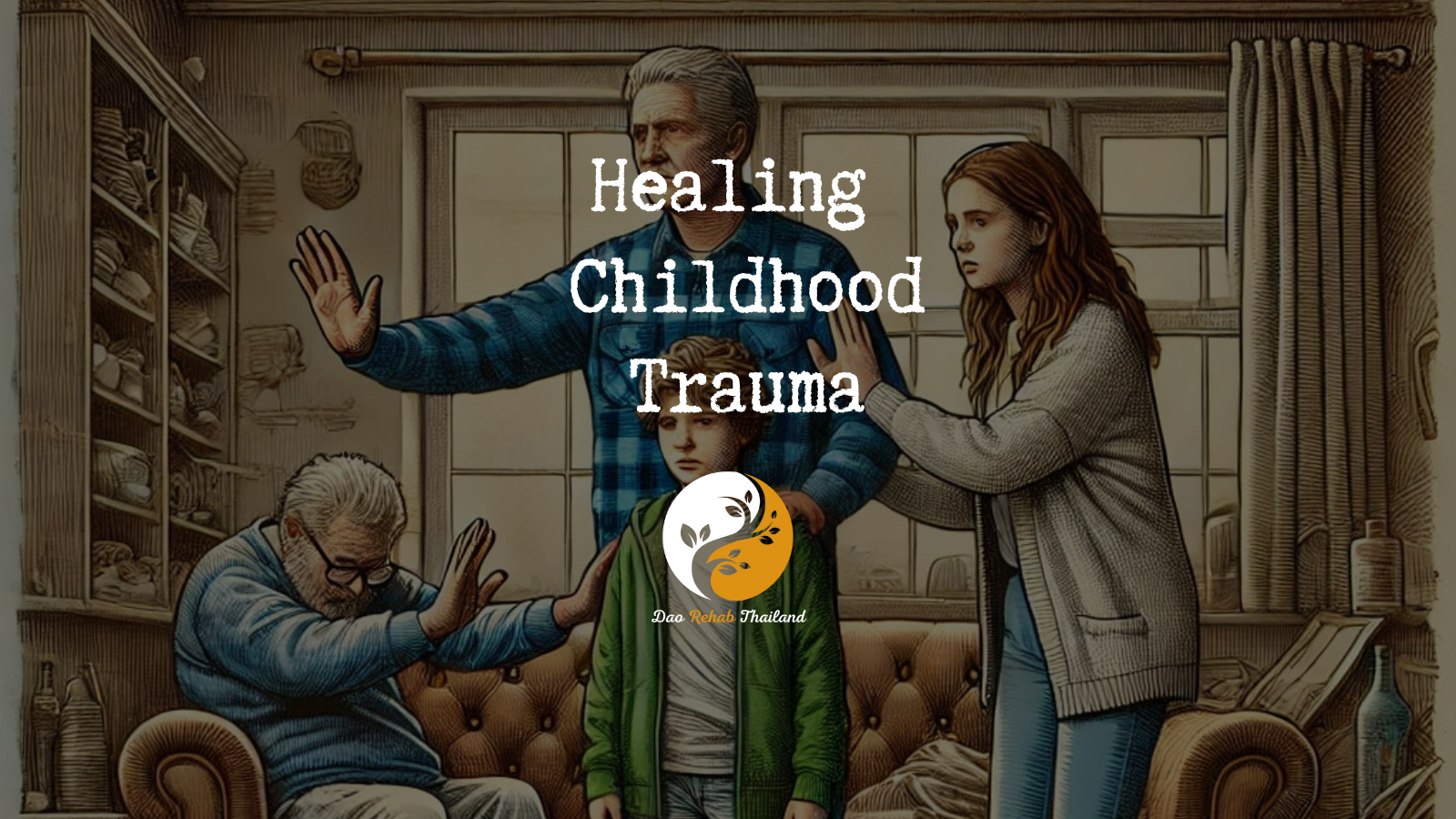
Carl Jung on the collective unconscious
Carl Jung on the collective unconscious
“Turning the impossible into possible”

"Detox from Drugs at a Luxury Holistic Center in Thailand and Israel"

Carl Jung on the collective unconscious
Carl Jung’s book on the collective unconscious presents a revolutionary concept in psychology, emphasizing the importance of the deep and shared layer of the human psyche. Jung argues that beyond the personal layer of psychology, which includes the memories, experiences, and unique characteristics of each person, there is another layer – the collective unconscious. This layer contains images, symbols, and archetypal patterns that are common to all humans, regardless of culture, origin, or historical period.
"Holistic Center for Trauma, Addiction, and Mental Imbalance Treatment in Thailand"
“Come to the beginning of your journey to freedom from addiction to alcohol, drugs, and pills, and rediscover your life within the serene embrace of DaoTherapy Rehab in Thailand—where holistic healing meets empowering recovery.”
DaoTherapy Holistic Rehab
Key Elements of Drugs Detox:
Medical Supervision: Drugs detox must be conducted under medical supervision, as the body may experience withdrawal symptoms. These can include nausea, anxiety, muscle aches, and insomnia. A medical team will monitor and manage these symptoms to ensure the patient’s safety and comfort.
Holistic Therapies:
Holistic Therapies: Many detox programs incorporate holistic therapies such as mindfulness, yoga, and meditation to help individuals cope with stress and anxiety during the detox process. These therapies support the mind-body connection and contribute to overall recovery.
Tapering Process
Tapering Process: Drugs detox often involves a gradual tapering of the drug to reduce withdrawal severity. Doctors will slowly decrease the dosage over time to allow the body to adjust to lower levels of the substance.
Psychological Support:
Psychological Support: Like any addiction recovery process, detox from Drugs includes psychological support. This can involve counseling, therapy, or support groups to address the mental and emotional aspects of addiction.
Post-Detox Treatment:
Post-Detox Treatment: After completing detox, continuing treatment is crucial to prevent relapse. This often includes participation in ongoing therapy, group support, and the development of new coping strategies to maintain sobriety.
The Archetypes, According to Jung
Archetypes, according to Jung, are dynamic structures inherent in the collective subconscious and constitute a kind of templates or models that shape the way we perceive and interpret the world. They are not abstract intellectual concepts, but driving forces with deep emotional power. Archetypes are expressed through symbols, images, and recurring motifs found in the mythologies, dreams, art, and literature of different cultures around the world.
Jung identifies several central archetypes, including the persona (the external mask we present to the world), the shadow (the dark and repressed parts of the personality), the anima and the animus (the feminine and masculine images within us), the hero, the wise old man, and more. Each of these archetypes represents a certain aspect of the human psyche and influences the way we behave and react in different situations.
According to Jung, archetypes are the common ground of humanity and reflect our evolutionary heritage. They contain the collective wisdom accumulated over many generations and provide us with an internal roadmap for dealing with life’s challenges. Connecting with archetypes and mythology allows us to find meaning and purpose in human existence, and to feel a sense of belonging to the larger story of humanity.
However, in modern society, focused on material achievement and technological progress, there is a tendency to ignore or repress the archetypal dimension of life. Jung warns of the dangers inherent in disconnecting from our deep psychological roots. When we lose touch with mythology and archetypes, we may experience a sense of alienation, meaninglessness, and inner confusion. Repression of archetypes can lead to the emergence of psychological symptoms, such as anxiety, depression, and destructive behaviors.
To deal with the situation, Jung proposes the process of individuation – a journey of self-discovery and personal development, the goal of which is to achieve psychological wholeness. During the process, the person is required to confront his inner shadows, explore the repressed parts of the soul and acknowledge their existence. This is a challenging and sometimes painful journey, but necessary for true growth and self-fulfillment.
The process of individuation involves expanding awareness and creating a bridge between the conscious and the unconscious. The person learns to listen to inner voices, dreams and intuitions, and to recognize their importance as tools for self-understanding. By working with dreams, active imagination and other methods, it is possible to uncover the symbolic messages that arise from the subconscious and derive significant insights from them.
At the end of the individuation process, the person reaches a state of internal integration, in which he accepts all parts of his personality and achieves a sense of wholeness and unity. He is able to live a more authentic life, in harmony with his true self and the archetypal forces that operate through him. This is a state of psychological maturity, in which the person realizes his inherent potential and contributes to society from a place of meaning and purpose.
Jung demonstrates the importance of connecting to archetypes through clinical cases from his therapeutic work. He describes a patient who suffered from phobias and anxieties due to a disconnection from her cultural and religious heritage. The patient, a Jewish woman of Galician origin, lost touch with her roots and the tradition from which she came. As a result, she experienced deep internal conflicts and disturbing mental symptoms.
Only after Jung explored the patient’s background in depth and revealed the disconnected connection to her Jewish identity did the healing process begin. He helped her reconnect with Jewish archetypes, such as the figure of the Divine Presence or the Merciful God, and find in them a source of comfort and strength. Gradually, the patient was able to integrate her heritage into her life and develop a renewed sense of belonging. Her symptoms subsided, and she found a deeper meaning in her existence.

contact us
Contact us with your questions
We would love to speak with you! Feel free to reach out with any questions.

get in touch
Schedule a free consultation
Schedule a free consultation with our team and let’s make things happen!
Potential for healing and growth
This case illustrates how disconnecting from and repressing archetypes can lead to psychological suffering, while reconnecting with them holds the potential for healing and growth. Jung believes that modern psychology needs to recognize the importance of the archetypal dimension and integrate it into a comprehensive understanding of the human psyche.
However, Jung is aware of the challenge involved in integrating the archetypal concept into the modern world. He acknowledges that the prevailing scientific approach tends to focus on the physical and objective aspects of reality, neglecting the symbolic and spiritual dimension. However, in his opinion, without recognizing the importance of archetypes, psychology will remain partial and limited in its ability to understand the complexity of the human psyche.
Jung calls for an integrative approach, combining scientific insights with the ancient wisdom embodied in mythologies and spiritual traditions. He believes that only through a fruitful dialogue between the various fields – psychology, anthropology, philosophy, religion and art – can we reach a deeper understanding of human complexity and the archetypal forces at work within us.
Ultimately, Jung’s central message is that connecting with archetypes and mythology is essential for mental health and self-fulfillment. In a modern world characterized by a fast pace of life, constant pressure and a sense of alienation, there is a more urgent need than ever to find ways to return to the inner depth and find true meaning.
Jung’s theory invites us to expand our consciousness, explore the inner dilemmas of the soul and embrace the symbolic richness inherent in the cultures of the world. It encourages us to see ourselves as part of the great human story, which spans generations and cultures, and to find inspiration and strength in it.
In this sense, the collective unconscious is a kind of universal heritage that belongs to all of us, connecting us to our common roots as humans. By cultivating awareness of archetypes and integrating them into our lives, we can develop mental resilience, self-compassion, and a deeper sense of belonging.
The journey of self-discovery and connecting to the archetypes is a personal and unique journey for each person. It requires courage, honesty, and a willingness to confront our inner shadows. But it is also a journey full of potential for growth, change, and self-fulfillment. Ultimately, connecting to the deep patterns of the soul can lead us to a life full of meaning and purpose, in which we realize our inherent potential and contribute to the world from a place of wholeness and authenticity.
Key insights from Dr. Mizrahi Avraham:
1. The collective unconscious is a repository of ancient images common to all of humanity.
2. Archetypes are dynamic structures of the psyche that shape our experiences and our perception of the world.
3. Mythology is the symbolic language of the psyche, which expresses the activity of the archetypes.
4. The individual cannot exist without the context of his historical past and culture.
5. The therapeutic relationship is influenced by transference relationships, in which the patient connects the therapist with figures from his past.
6. The study of myths and symbols can provide a deeper understanding of the human psyche.
7. The encounter with archetypes can lead to a process of self-discovery and transformation.
8. The collective unconscious contains the ancient wisdom and accumulated experience of humanity.
9. The psychological development of the individual is intrinsically linked to the cultural and historical development of humanity.
10. Recognition of the collective dimension of the psyche can contribute to the individual’s sense of belonging and meaning.
practical advice:
1. Take time to explore the symbols and myths that speak to you, and consider how they reflect your personal experiences.
2. Notice recurring patterns in your life, and consider how they may be related to the activity of archetypes.
3. Cultivate awareness of the connection between your personal biography and the cultural and historical context in which you live.
4. Do not be afraid to explore your inner world, and discover the richness and depth that lies within it.
5. Remember that the journey to self-knowledge is an ongoing process of growth and development, requiring openness and curiosity.
6. Cultivate compassion for yourself and others, recognizing the commonality of all humanity.
Psychological Support:
Psychological Support: Like any addiction recovery process, detox from Subutex includes psychological support. This can involve counseling, therapy, or support groups to address the mental and emotional aspects of addiction.
self-talk mantras:
1. I recognize that my soul is part of a larger fabric that connects me to all of humanity.
2. I accept that much of my experience is driven by archetypal forces, and I am willing to explore them.
3. I am committed to a journey of self-discovery, and to the search for meaning and purpose in my life.
4. I recognize the value of listening to my inner voice, and deepening my connection with the unconscious world.
5. I trust my ability to realize my potential and contribute my unique part to the human fabric.
Thought provoking questions:
1. Do you believe that there is a “collective unconscious” common to all humans? How do you think this idea affects our perception of ourselves and society?
2. What do you think about the idea that mythology is an expression of “archetypes” that shape the life of the human psyche? Do you think that understanding mythology can contribute to a deeper understanding of ourselves?
3. How do human history and culture, according to the ideas presented, affect the psychological development of the individual? Do you identify with this view?
4. What is the meaning of a “transferential bond” between patient and therapist, in light of the discussion of the connection between the ego and the unconscious? How would you describe the importance of this bond in the therapeutic process?
5. Do you believe that the psychological approach presented here, which advocates paying attention to the historical and collective dimension of the psyche, is relevant to the challenges facing modern man? Why or why not?








